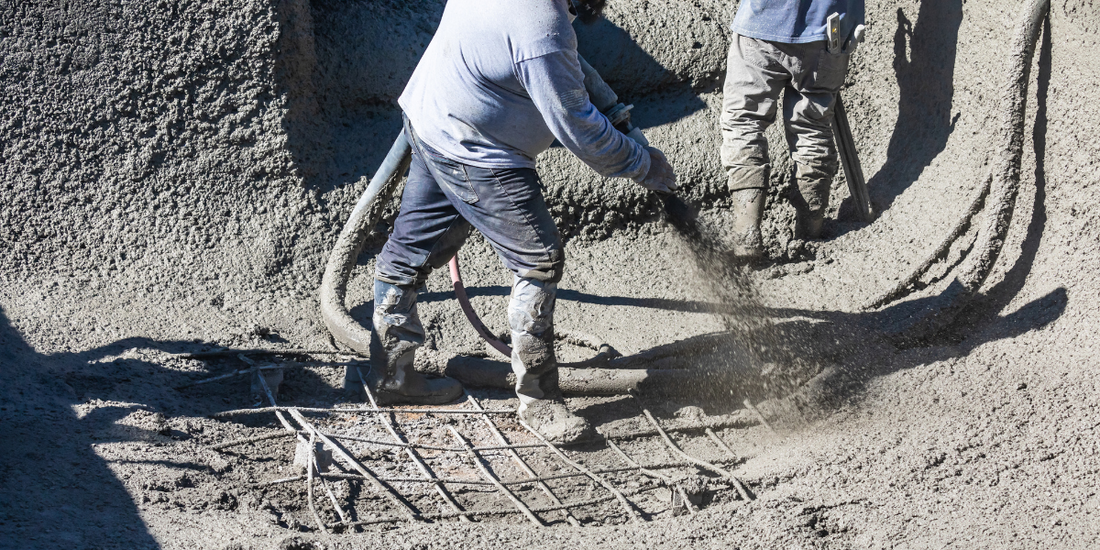While concrete, vinyl, and fiberglass are the most commonly used materials for building inground pools, Gunite is a relatively uncommon but effective alternative to them. This article delves into the world of gunite pools to uncover what sets them apart from other pool types. We will explore their advantages, disadvantages, and some important considerations before choosing a Gunite pool.
What is a Gunite Pool?
Gunite, also known as sprayed concrete, is a mixture of cement, sand, and water. It is basically concrete, but the application method is what makes it different. Gunite is sprayed using compressed air on a surface and is left to cure over several days.
Concrete, in its usual form, is quite dense and not very easy to work with. It dries quickly and is usually used with molds to create pre-made shapes or as a binder between bricks. Gunite is easier to work with due to its semi-liquid consistency and application method.
Gunite pools have been around since the 1940s but are usually preferred by people who want more customization and a long-lasting pool.
How are Gunite Pools Made?
Here's a quick list of bullet points to outline the step-by-step procedure for constructing a gunite pool:
- The pool construction company surveys your property and begins excavation after finding the right spot. The shape and size depend upon the type of design you want
- The next step is to install steel rebars and create a cage-type base along the walls of the excavated pit. The underground plumbing is also installed at this stage.
- The nozzleman (the expert who sprays the Gunite) will spray the gunite mixture all over the rebar structure to create a base.
- Multiple layers of Gunite can be applied several days apart to create a more sturdy structure.
- A gunite pool structure will take about a month to cure. Although, this duration can slightly increase based on the number of layers applied. The company will install accessories and complete any other construction nearby during this time.
- When the Gunite has cured, a layer of plaster or tile will be applied over it to create a consistent, smooth, and aesthetic surface for your pool.
Advantages of Gunite Pools
Take a look at a few advantages of gunite pools.
Better Durability than Concrete
Gunite pools are inherently stronger and more durable than concrete. It is because the Gunite is applied with pressure and in layers several days apart, making them a firm structure that can last for decades.
The conventional method of applying concrete doesn't allow it to bind well together when applied at different times. Besides, concrete should be applied entirely on a particular spot rather than in layers.
Almost all commercial construction is done using Gunite - this fact itself says a lot about its durability.
Many Customization Options
Since Gunite is essentially a thick paste of concrete, it can be sprayed into any shape and design. The options for customizing a gunite pool are endless, making it the first choice for people who want to unleash their creativity in their pool.
Gunite pools also allow you to experiment with aesthetics, and they also let you accommodate a wide range of features, such as waterfalls and vanishing edges.
Increases Value of Property
Since gunite pools are incredibly durable, many home buyers perceive an increased value of the property with them. These pools are also comparatively expensive to build, which further adds to the overall value of your house.
Disadvantages of Gunite Pools
After the advantages, let's take a look at the disadvantages of gunite pools:
High Costs and Long Construction Time
Gunite pools are the most costly type of pool to construct. It can cost four times as much as the cost of a fiberglass pool and almost 40% more than the cost of a vinyl pool. Additionally, it takes about a month for the Gunite to cure, leave alone the other construction (plumbing, tiles, patio, etc.).
More Maintenance
Gunite pools require more maintenance than their counterparts. Metals and alkaloids leech into the water from the plaster finish, and it is also more susceptible to algae growth. The plaster lining of gunite pools needs to be replaced every 7-10 years, plus it requires seasonal cleaning, acid wash, and higher quantities of chemicals due to its porous nature.
Surface Roughness
The surface of your gunite pool will degrade over time, and the plaster may not feel very smooth to the swimmer. It can cause bruises on feet or other body parts and require additional care.
Gunite vs. Other Pools
Since now we're aware of the advantages and disadvantages of gunite pools, let's quickly compare them with other pool designs.
Gunite vs. Fiberglass Pools
- Installation: Fiberglass pools come as pre-built units, and it is hectic to transport and install them. In comparison, gunite pools can be created on-site, making them a better choice.
- Overall Cost: Gunite pools can cost four times more than a fiberglass pool, making them the exorbitant option between the two.
- Maintenance: Fiberglass pools are far easier to maintain and clean than gunite pools. You don't have to worry about replacing plaster or adding chemicals too often.
- Lifespan: A fiberglass pool lasts 20-30 years, whereas a gunite pool can easily last 50 years if maintained properly.
- Aesthetics: As we already discussed, gunite pools can be customized in any way possible due to their construction method. At the same time, a fiberglass pool offers limited options for customization.
Gunite vs. Vinyl Pools
- Installation: Vinyl pools are easier to install because of their track-n-lock design, and the components mostly come pre-built, so it also saves a lot of time. Gunite pools take significant time, effort, and planning to build.
- Overall Cost: Gunite pools can cost two to three times more than a vinyl pool.
- Maintenance: Vinyl pools are easier to clean because they are inherently smooth and non-porous. They require lesser chemicals and repairs (unless broken) and are a better option here.
- Lifespan: A vinyl pool can last 30-35 years, although the vinyl liner must be replaced every 7-10 years. Gunite pools last far too long and cost more in liner replacements.
- Aesthetics: Vinyl pools look great, but the options for aesthetic enhancements are better with gunite pools.
Factors to Consider Before Choosing a Gunite Pool
Here are a few important things to consider when opting for a gunite pool:
Budget and Time
Your budget is The first thing you should consider when going for a gunite pool. Building an average-sized gunite pool can cost nearly $100,000 or even more. In comparison, a fiberglass pool can be prepared for as low as $26,000. However, a gunite pool adds much value to your property, so you can consider it a long-term investment.
Another thing to consider is how quickly you want your pool to be ready. Starting from scratch, it can take between two months to over a year (in some situations) for your gunite pool to be prepared and functional. On the other hand, a vinyl pool can be completed in as low as three weeks.
Maintenance Commitment
Be ready to undertake maintenance responsibilities of regular cleaning, surface maintenance, and water balancing. Gunite pools are durable, but you need to watch out for algae, water chemistry, and conduct acid washing due to the plaster lining.
Conclusion
A gunite pool is the most durable and customizable type of pool you can opt for. It has an incredibly long lifespan and adds a lot of value to your property if you ever want to sell it. However, its downsides are high initial costs, long construction times, and higher maintenance than its counterparts.
FAQ's
Take a quick peek at the most common questions about gunite pools.
How much does a Gunite Pool cost?
Constructing a regular-sized gunite pool (14 by 28 feet) costs about $100,000 on average and may increase or decrease depending on the size.
How long does it take to make a gunite pool?
Installing a gunite pool can take between six to eight weeks. However, it also depends upon the size, weather conditions, and features of your pool.
What is the lifespan of a Gunite Pool?
A well-built gunite pool can last anywhere between 50 years to 100 years with proper maintenance.
Can a Gunite Pool be painted?
Yes. To improve aesthetics, a gunite pool can be painted with epoxy or acrylic paints.
How often should you resurface a gunite pool?
It would be best to replace the plaster liner once every seven to eight years.
References
https://texasfiberglasspools.com/gunite-vs-fiberglass-pools/
https://www.neavegroup.com/blog/pools/gunite-pools-vs-vinyl-liner-pools/

